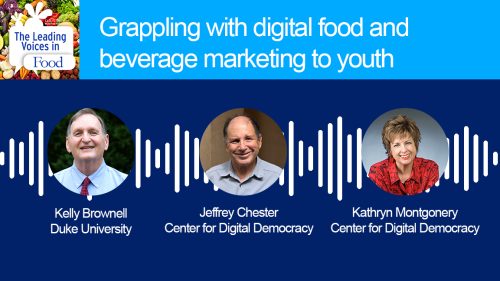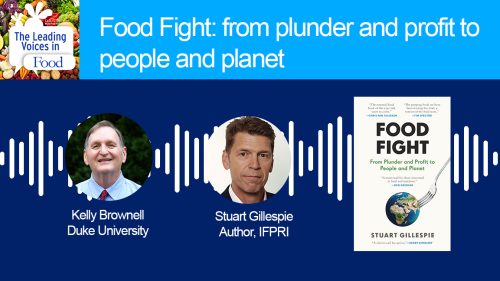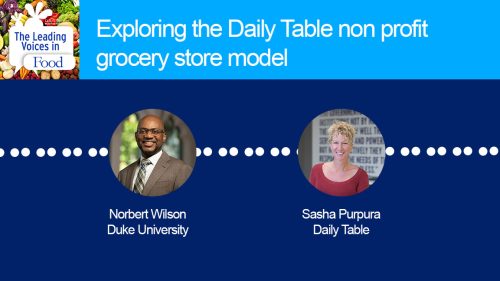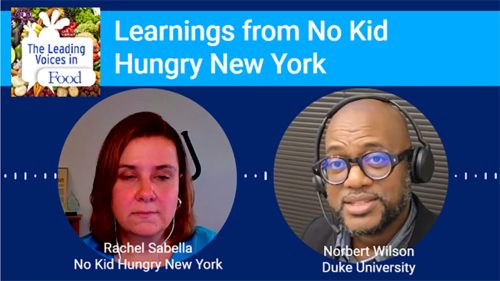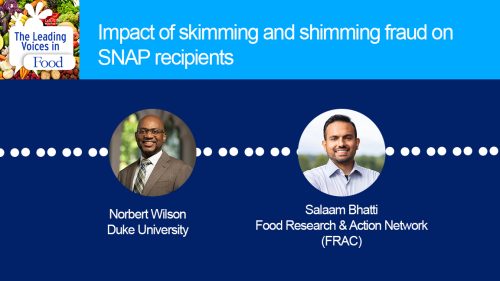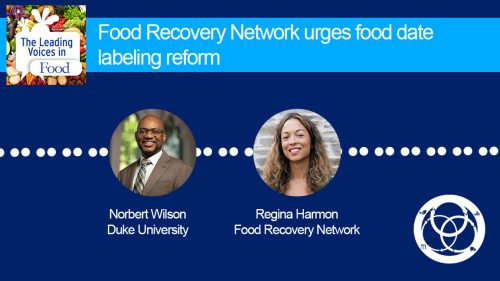The Leading Voices in Food
E118: Joel Pitkowsky on MAZON – A Jewish Response to Hunger
You may not automatically think of faith organizations as advocates for a stronger food system, but boy are they ever. I’m talking today with Rabbi Joel Pitkowsky of Teaneck, New Jersey. Rabbi Pitkowsky, in addition being a rabbi, is a leader and is on the board of directors for MAZON: A Jewish Response to Hunger. This is a national advocacy organization working to end hunger among people of all faiths and backgrounds in the United States and in Israel.
Subscribe: Apple Podcasts | TuneIN | YouTube Music | SoundCloud | PocketCasts | Radio Public
Tags: Advocacy & Food | Equity, Race & Food Justice | Food Insecurity | Food Policy |

Rabbi Joel Pitkowsky has been inspired by MAZON for over thirty years, and has been an active donor for nearly as long. He believes that freedom from hunger is a human right and a Jewish value and that we owe it to every human being to have a vision of what we want our world to look like, and to help make that vision become a reality.Joel is a Conservative rabbi in Teaneck, NJ, and is a graduate of Rutgers College and The Jewish Theological Seminary of America. He is also a Senior Rabbinic Fellow of The Shalom Hartman Institute in Israel. In addition to his work with MAZON, Joel is a member of the Rabbinical Assembly’s Food Justice sub-committee and is a board member of Camp Young Judaea Sprout Lake. Rabbi Pitkowsky and his wife have two children.
Interview Summary
I’d like to just say a little bit about my understanding of the work of MAZON which I greatly admire, and then have you fill in and give us a richer view of this. So I know that the organization has worked towards systemic change to address hunger and the root causes of hunger for nearly 40 years now. And I know that the work has focused especially on low income populations of problems that have been previously overlooked or ignored and that could include food insecurity in military families, veterans, single mothers, Native Americans, LGBTQ, and the seniors. So this is the first podcast in a series that we’re doing in partnership with MAZON where we delve into these issues. And let’s start off with this question. So what is the Jewish connection to ending hunger? And what values and traditions drive MAZON’s mission?
We derive our mission all the way back from the beginning of the book of Genesis and from the values that we see as being central to a Jewish view of the world. The Jewish view of the value of each human being and really a vision for what we hope the United States can be. We’re a country still in the process of becoming and that idea is really core to what we do. So in Genesis chapter one, we read that as God created human beings. Each human being is created in the image of God, meaning each one of us has a spark of divinity. Each one of us regardless of any particular characteristic about us – not because of our material success, not because of our color or gender, anything, just because we’re human – we have infinite value. We believe that idea calls us to justice, calls us to treat all human beings with that notion in mind. And that’s where it all begins for us.
We continue by thinking about, by drawing upon sources in the Bible, in the Jewish tradition, we read in the Book of Leviticus that we should leave the corners of our fields for those who are hungry, for those who are poor. We read over 30 times in the Bible that we should protect the stranger, the widow, the orphan. Those were terms that were meant to teach us about protecting those who did not have power in society. Those who were powerless. We think about the Jewish idea of tzedakah, which is often translated as charity, but it really is much closer to justice. Meaning in the Jewish scheme of the world, if you don’t give your charitable giving – which again the Hebrew term is tzedakah – then it’s not that you’re being cheap, that you just choose not to give, it’s that you’re not giving what you have to give. You’re obligated to give to help others.
All of these ideas taken together shape for us a vision of what human beings owe other human beings. And that’s why when MAZON was founded, it was founded as a Jewish response to hunger for all people. We work incredibly hard to shape a world, to create a world where people, again, we focus on the United States and Israel where people in the United States are not hungry because no one deserves to be hungry. That’s just not the world we think we should live in. And it’s not that there’s not enough food, there is plenty of food. It’s not being allocated correctly, it’s not being given to those who need it. So all of these ideas for us come together with those Jewish values, bringing us forward to a vision of what we think our country could be, what the United States could be, how we could be treating each other. And it all comes down to this idea of the value of each human being and a notion of justice.
Thank you for sharing your view of how hunger and food systems and human compassion fit into the spiritual tradition that you outlined. So let’s get back to MAZON and talk about its founding in history. So why do you believe a Jewish voice is important in the fight to end hunger?
MAZON was founded by Leonard Fein – may his memory be a blessing – in 1985. And from the start, synagogues were encouraging individuals to donate a portion of the cost of their lifecycle celebrations to address hunger. This was sort of a modern interpretation of the ancient Jewish tradition of not having celebrations in your small towns unless everyone was invited. Meaning the poor, the hungry, everyone was supposed to have a seat at the table, literally and figuratively, everyone should be included.
So we quickly became more and more involved fighting hunger and communities around the country. And we learned that the only way to truly end hunger was to change the systems and circumstances that allowed it to persist. We have come to identify and pursue long term systemic policy solutions so that all people can feed themselves and their families with dignity. We know only too well that we cannot food bank our way out of the hunger crisis in the United States. It’s just not possible. The only entity that has the ability to really put an end to hunger, and to give people the ability to raise themselves out of that situation – because no one wants to be there. The only entity that can do that is the federal government. So we are pushing efforts to strengthen the federal safety net because we think that is the most effective and efficient way to prevent people from being hungry in the first place. We also think that that’s what our government owes the people who live here. But that aside for a moment, we think it is the most effective way for change to happen.
The comments that you just made speak to this broad issue of whether addressing food security issues is a matter of providing more charity or providing justice. Can you talk about your thoughts on how those two concepts differ?
Sure. So I know from my own personal experience the incredible feeling that I get and I assume other people get too when they participate in food can collections or when you give out food at a food bank to people who come, or at a homeless shelter, I’ve done all of those things, those are all meaningful, powerful, and very, very important for people who are hungry today. But we also know that those activities while meaningful, powerful and important are not going to solve hunger because those people will just come back another day. COVID-19 has really revealed just how many Americans are living just at the edge of poverty. Before the pandemic, nearly 40 million were facing hunger. That was the number of people that had SNAP benefits. We believe that that number has now at least doubled if not tripled in the past 12 months.
It’s become clear if not completely obvious, that charitable programs just cannot address the full scope of hunger. Food Pantries, Soup Kitchens, other distribution sites that operate on a country, they were never intended to meet the needs of all of those facing hunger. They were supposed to be just the last stop when everything else was exhausted. They’re not structured or funded adequately to meet the scope of hunger we’re witnessing today. And we believe that only the federal government has the resources to meet today’s needs. Again, in addition to the idea that we believe that the federal government has a moral responsibility to do that. So charity is wonderful. Charity is one of the ways that as human beings, we express our compassion, our empathy for others. And that should continue. I am grateful that there are people all over the country who give to others, who give to either organizations or direct service, who give food so that someone else, their neighbor or someone down the street whatever it is, can be fed, but charity is just not gonna solve the hunger crisis that we have in our country. The problem is just too large.
We’re commanded in Deuteronomy to pursue justice. That’s what the book of Deuteronomy says. Justice, justice, you shall pursue. The idea I think behind the repetition of the word, because it’s in the original Hebrew as well, the repetition of the word justice, is that we can’t just sit back and wait for a charitable organization to take care of someone. We can’t wait for the neighbor down the street. We have to see it as our problem and by our, I mean the larger human community but let’s just talk about the United States. That is our issue as a United States nation full of citizens and non-citizens, and we need to take a proactive stance. The notion that some people have that we can just sit back and wait for local charities, local food banks, or even much larger organizations to take care of the issue, I think it’s really abdicating responsibility. We need to step up and we need to act. And by we, I mean the United States and the organization, the entity that can do that in the best, most financially efficient and effective way is the federal government.
I appreciate your thoughts on that issue of moving from charity to justice, because more and more people are beginning to talk about this. And I suspect that over time, this could lead to some pretty profoundly different ways of looking at the issue. So let’s talk a little bit more about what happens on the ground. Can you give us some examples of ways that MAZON and its partners have seen success in fighting hunger?
Sure. In the last year we have employed some new ways, some new ideas to advance our goal of ending hunger. So let me just talk about a couple of those. Back in March of 2020 – it feels like a lifetime ago but it was less than a year ago – when we were just starting to really understand the impact of the pandemic, MAZON moved quickly to create a 50 state hunger resource guide to connect people to vital food assistance programs. Many of which are led and administered by our anti-hunger partners around the country. The Jewish community rallied around MAZON in new and inspiring ways. In November, we held a virtual Jewish clergy justice mission engaging over 75 communal leaders from around the country and speaking our truth to power. We met virtually with more than 50 Members of Congress, their staff to urge immediate action to boost benefits to the Supplemental Nutrition Assistance Program or SNAP formerly known as Food Stamps, which was actually enacted a month later.
Several years ago we created the Quick Reaction Fund, QRF, which enables us to respond to rapid response initiatives that may arise in a moment’s notice. For instance in December of this past year in Nebraska was the only state to refuse SNAP emergency allotments. So we worked with our partner in the state to persuade Nebraska state government to authorize the Pandemic EBT program, which provided additional food assistance to 61,000 families. For us these are victories, they’re small victories, but they are victories because they point a way forward. That when we work together with either local officials, local organizations in different states, or at the federal level when we go to DC and we lobby, and we let people know about some of these issues, we find that people are very receptive. I’ve met personally with dozens of members of Congress and staff members. No one wants people in their district to be hungry. That’s not the moral character of the people that are in our government. We don’t always agree on how to end that hunger but the idea that anyone in their district or anyone in their state is hungry is anathema to them is really terrible. So that’s the first step. And the next step is figuring out goals that we can meet, goals that are possible and working within the system of lobbying and advocacy and education to make those ideas into tangible reality and tangible results.
So let me ask one final question. So what are some of the common misconceptions about who faces hunger and how much does MAZON work to combat these misconceptions?
The most common misconception about hunger in the United States is that the face of hunger looks nothing like me whatever I look like. Whoever is speaking, it can’t be anyone like me. It must be people who look different or have a different skin color, have a different background who aren’t educated the way I am, didn’t work as hard as I did. We could list two dozen ways that I could be different than you. All of that is just not true. Hunger cuts across every divide in our country. Hunger is not a red state or blue state issue, it is just a United States issue. Hunger is not for people of one color or another, hunger is not limited to people who have a certain kind of education. Hunger really strikes everyone in our country. And I think that the psychological barrier that people have in not wanting to see or not being able to see that hunger looks just like them, that is very, very difficult to break through that wall that people put up, probably just as a defense mechanism. They don’t want to think. There but for the grace of God go I, they don’t want to feel that one day they could be there.
Several years ago we created an exhibit called the This is Hunger where we had a wonderful photo journalist take a few months, go across the country to food banks, to shelters, and take photos of people. And those photographs formed the basis of an exhibit that we put together called Faces of Hunger which we ended up putting in an 18 wheeler tractor trailer when we brought it all over the country to dozens and dozens of different sites for people to go inside and to see this incredible multimedia exhibit featuring people’s stories and their own voices and photographs of people that look just like me. The explicit mission of that exhibit – which again is called Faces of Hunger, and there’s a version of it on our website mazon.org – the mission of that was to break down those barriers and for people to really understand that hunger affects all people, hunger affects all of us. I remember these stories, people who are veterans of our armed forces, people with college degrees, and people with advanced degrees, all it takes for some people. And this is I think what I was referring to before when COVID has really illustrated for us, sort of blown open this conception of just how many people live right on the edge. Right on the edge of hunger. All it takes is one unexpected medical procedure or one unexpected loss of a job, or some other unexpected financial challenge that puts people over the edge from living within the ability to have a home, within the ability to pay for their groceries and not being able to. That line is permeable, that line is very hard to see until you’re on the other side of it, and that line is I think right where many, many, many people in our country live far more than anyone suspected.


